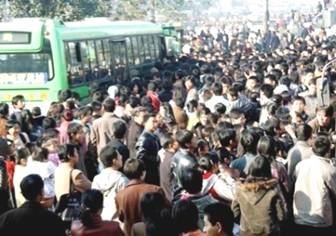|
||||||||
|
||||||||
|
||||||||
The Urban Crisis [A] One goal of many Americans and Canadians is to move out of a busy urban area such as New York, Los Angeles, or Toronto. They say that they want to escape from pollution (for example, smog and noise pollution). They want to get away from crime. They’re tired of the crowds of people each day on the mass-transit systems—buses, commuter trains, and subways. Or, if they have cars, they would like to avoid the traffic that they get into when they commute daily from their homes to their offices and back. These people believe that life would be better in the suburbs—that is, the areas just outside the city—or even farther away, in the countryside. [B] This dream of a better life in another place is certainly not unique to people living in the United States and Canada. However, this dream may take various forms in different parts of the world. In some areas, there is a movement to countryside; in contrast, millions of people are moving away from rural areas in other countries. In other words, in much of the world there is an exodus from the countryside to the cities. The urban population in most developing countries such as India and Nigeria is increasing very fast.
[C] The statistics are not pleasant. In 1993, the world population reached 5.5 billion. More than 1 billion of these people lived in cities in the developing nations. People who study population growth predict that by the year 2025, the population of the world will be more than 8 billion. These experts say that cities in developing countries –where overpopulation will be especially serious—will be home to almost 4 billion of these people. [D] There are several reasons for this enormous population growth. Of course, there is a general increase in the world population because modern medicine and new methods of food production allow adults to live longer and babies to survive, not die soon after birth. In Latin America, where seven out ten people already live in cities, most future growth will be from this natural increase. But in many other countries millions of people are moving to urban areas because they must find work. “In a poor country like India, they don’t come looking for the comforts of city living; they come for jobs.” says Rajinder Kuman Takkar, a government official in Delhi. There simply aren’t jobs in the countryside. There isn’t enough good farmland for large families in rural areas. In addition, farming methods are not always modern. These out-of-date methods cause farms to be unsuccessful. These problems are worsening, not getting better, so more and more people are leaving their homes to find a better life in cities. [E] Is life better in cities? Probably not. Many people find that the city of their dreams has become a nightmare. Population growth is causing unbelievable overcrowding. Nairobi, Kenya, for example, has basic services for 200,000 people but will soon have a population of 5 million. Mexico City is home to almost 25 million. This overcrowding causes many serious problems: traffic, pollution, sickness, and crime. There isn’t enough water, transportation, or housing. There aren’t enough sewers; in Sao Paulo, Brazil, for instance, only 40% of the homes are connected to the city sewer system, which carries away dirty water and waste through pipes under the ground. Perhaps most serious of all, there aren’t enough jobs. One-third to one-half of the people in many cities in developing nations cannot find work or can find only part-time jobs. Millions of these people are hungry, homeless, sick, and afraid. The crisis is worsening daily; that is, this time of danger and difficulty is becoming more horrible every day. Population experts tell us that by the year 2025, the population in cities in developing nations will increase to four times its present size. [F] The situation seems hopeless, but perhaps it isn’t. The answer to the problem”…is to provide jobs for them where they live, where they were born,” Takkar says. Beijing, Cairo, New Delhi, and other urban centers are trying to create smaller cities, in the countryside, with jobs and housing. The hope is to slow the exodus of rural people to the already overcrowding cities
|

